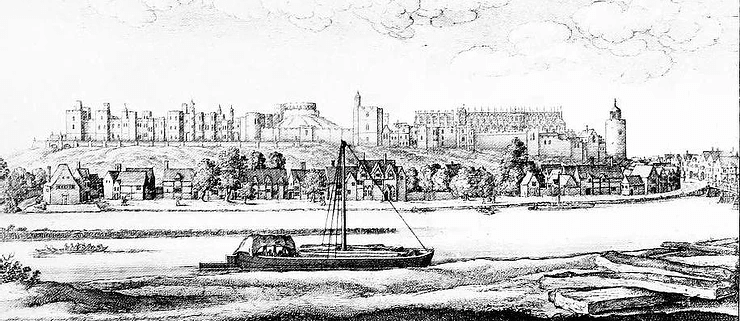Windsor: The Town
Windsor is thirty (30) miles west of central London, just beyond Heathrow airport. It is often linked to London but is officially within the Royal County of Berkshire. Historically it has been associated with two major institutions: Windsor Castle, built 1070-86 by William the Conqueror; and Eton College, founded in 1440 by King Henry VI and alma mater of Boris Johnson. Now it is also associated with the M4 motorway and Legoland.
In Shakespeare’s time the population of Windsor would have changed throughout the year, swelling when Elizabeth 1 was in residence. It is difficult to estimate the number of citizens since there was no census until the 19th century. but Tim Lambert, author of ‘A Brief History of Windsor, Berkshire, England’, estimates that “by the late 17th century the population of Windsor had probably exceeded 2,000”. (http://www.localhistories.org/windsor.html) The economy of Windsor was driven by three major forces: the court, the school and the market. Firstly, there was the court, which would have brought a major influx of people into the town and employed a range of trades and professions, including of course that of doctor. Indeed Dr Caius hints at a courtly array of patients when he speaks to the Hostess in Act 2, Scene 3: “By Gar, I love you, and I shall procure-a you de good guest; de earl, de knight, de lords, de gentlemen, my patients.” (82-4) Elizabeth apparently preferred Windsor over other royal palaces, despite (or perhaps because of) its being smaller in physical size. There is no easily accessible record of the amount of time she spent there but when she was in residence the town was full of courtiers, diplomats, foreign politicians and representatives and the itinerant band of entertainers, hustlers, tradespeople and so on that accompanied the court.
The school was relatively self-contained, and there was that old British tradition of the distinction between town and gown. but it would have provided some employment to townspeople as cleaners, stable hands, cooks and so on.
Windsor is often described as relatively poor, yet it contained a rich merchant class. The Elizabethan period was a time of burgeoning mercantile adventure for England, much of it sea-based, which might account for the proliferation of shipping imagery in the play. Page and Ford are both wealthy, and though the play does not identify the source of their wealth it most likely came from food, spices, textiles and minerals from Africa and the New World. They might even have dealt in slaves, though to my mind it is likely that if so, the Shakespeare who wrote The Merchant of Venice and Othello would have made something of it.
It may be of significance that some 35-40 years after Merry Wives was written a law was enacted in the town to prevent residents from allowing their pigs to wander freely in the streets.




Leave a Reply
Want to join the discussion?Feel free to contribute!